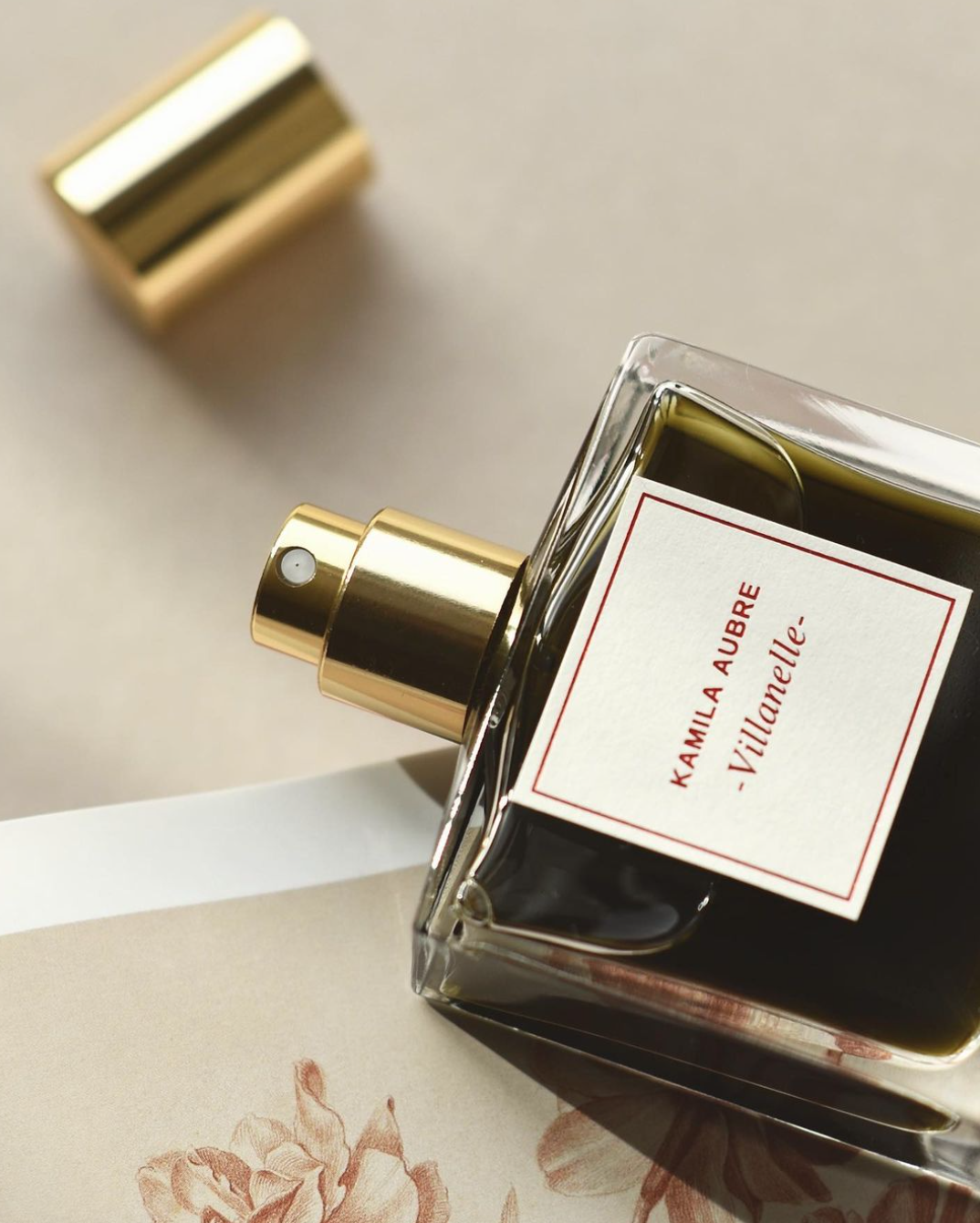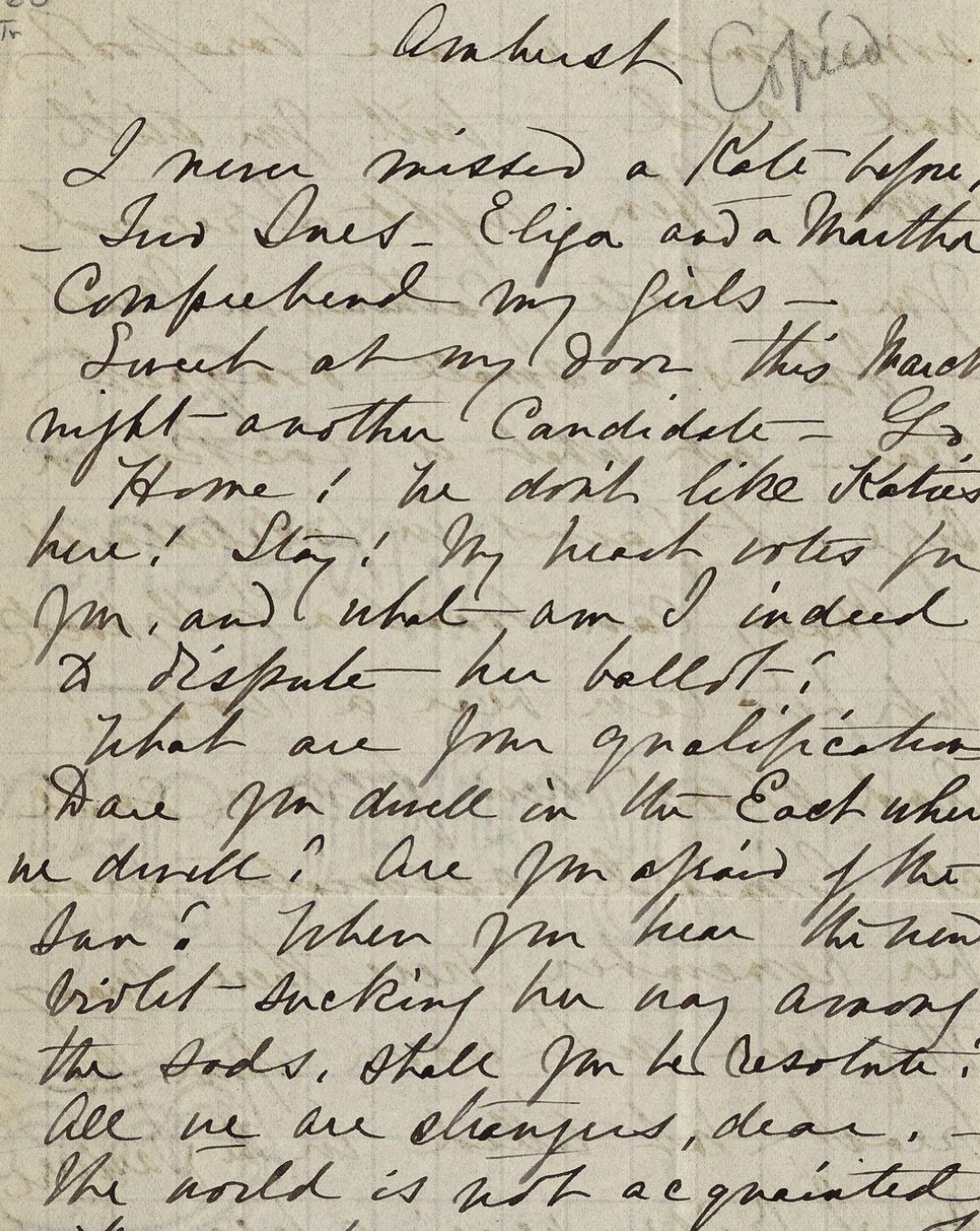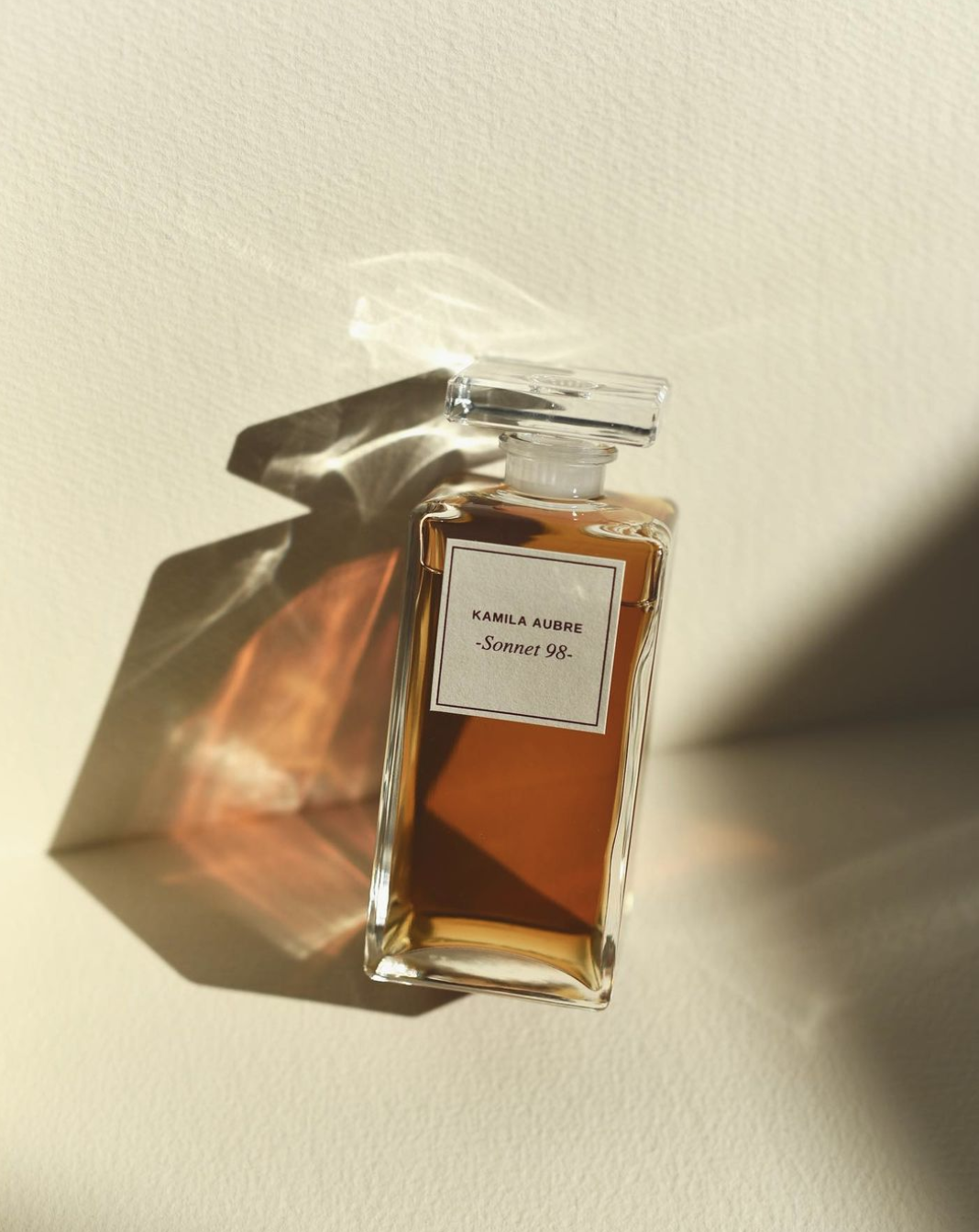in dialogue: kamila aubre
Kamila Aubre is a botanical perfumer based in Antwerp, Belgium. We interviewed her about her eponymous line and the symbiotic relationship between materiality and time in her work.
LG: There appears to be a deep symbiotic relationship between the ‘senses’ in your work. Can you speak to how poetry and music influence your scent development process? KA: Any experience leaves it’s impression, some people are more sensitive, some - much less. I think artists are the former ones. I see scent and inspiration in many things and it is only a matter of time that stops me from making more perfumes. Poetry is a slow experience which means you must read and re-read a single poem to understand it, music works in the same way. Re-experiencing art is as important as the first encounter with it. Botanical scent is perfect to imprint memories and replay them later. Poetry carries a lot of word plays, metaphors, complex words and ideas, whereas music works in layers to create a melody or a whole symphony. The complexity and multi-interpretive elements of art are the components I am looking for every time.
What is a Villanelle? “A French verse form consisting of five three-line stanzas and a final quatrain, with the first and third lines of the first stanza repeating alternately in the following stanzas. These two refrain lines form the final couplet in the quatrain.”
From the eyes of Kamila Aubre, a Villanelle expresses in scent as a poem, a song, a fragrance, a character, an identity. For more visit Aubre’s journal “What is Villanelle?”
“The stories behind perfumes invite you to explore the subject, they do not necessarily need to relate to you but they can open a conversation about the subject. Scent is a multidimensional tool, you never know how and when you may need to use it.”
We have been exploring the idea of sustain in Salonnière. To us that means moving into a reciprocal relationship with nature, finding ways to extend the life of products and being mindful of the business models we support. You launched a Cyclical Perfume initiative. Can you tell us more about how that permeates everything from your creative process to distribution model? Sustainability is so complex but, in my opinion, it can never be perfect. It is definitely a journey in itself. Being a small business means investing not only ideas but also resources, including financial ones. Even when that is viable, there is still something which stops your perfume line from being more or less sustainable. The problem with artists is that they think faster than they can create and produce. Cyclical perfumes are perfect for that purpose. The term I created myself means that perfumes belong to small collections or concepts and flow in one direction. For example, Immensité Bleue perfumes have darker themes, from our relations with ourselves (mental health) to our fragile relations with others. The concept is flexible but allows me to create more scents in the one message I want to deliver. Making scents in micro-batches allows me to control my inventory better. There is a certain need to discount products after a few months or so and I see it with many small retailers too and I really want to avoid it. Natural perfumes last for years (and get better like wine) and there is no need to devalue them, especially because they are made responsibly by hand. As soon as artists understand this, sustainability comes naturally by itself. On the other hand, to support the sustainability concept and save resources, I do apply sales to avoid waste: for example, natural perfumes can sometimes be unpredictable and leave sediment, rebottling means waste, such items are sold with a discount and can still be used by customers. It is really how you can use the ready marketing and sale tools to your advantage in support of your ethos.
“Immensité Bleue Collection, is the ‘blue immensity’, a ‘vase of sadness’ as noted by Baudelaire in one of his nocturne poems, the shadow archetype as seen by Jung, the darker, unknown and frail part of ourselves and our environment.”
“The series invites you to explore a different side of our personalities, not often spoken about, in times of despair, hopelessness as well as ways to overcome them through scent.”
“Interconnection permeates everything in nature and botanical scents are able to show that: any art form is inspired by previous creations, every artist takes ideas from many other artists before him/her and it is such a natural process that we do not even realise it...It is not as much imitation as an unconscious act, simply because sensitivity, attention and awareness are inherently part of our psyche, they have been there for our survival and are perhaps, part of our instincts. As we have fewer physical dangers in our life, we must head our inner self in other directions which is art.”
You describe your scents as “inspired by an intersection of different art forms as symbols of interconnection of our psyche and nature”. What was the genesis of this intersectional approach to perfume? It seems unique to your eponymous line. The interconnection permeates everything in nature and botanical scents are able to show that: any art form is inspired by previous creations, every artist takes ideas from many other artists before him/her and it is such a natural process that we do not even realise it. When we create, we take forms, shapes, colours, whatever is necessary as seen in nature. It is not as much imitation as an unconscious act, simply because sensitivity, attention and awareness are inherently part of our psyche, they have been there for our survival and are perhaps, part of our instincts. As we have fewer physical dangers in our life, we must head our inner self in other directions which is art.
“Mythopoeia is a narrative genre in modern literature and film where a fictional or artificial mythology is created by the writer of prose or other fiction. This meaning of the word mythopoeia follows its use by J. R. R. Tolkien in the 1930s. The authors in this genre integrate traditional mythological themes and archetypes into fiction.”
You use a slow movement approach - mindful practices, connection with the objects and materials, choosing quality over quantity and micro batches and/or limited editions - how does materiality ground you and your products? I find the "fait à la main" process very satisfying by itself and it perfectly reflects the connection between me and the objects I make. Although perfumes are very abstract in their nature, it is the manufacturing steps which are essential: selection of oils, testing, blending, filtering, bottling, labelling, packing... The idea of making scents myself at every step, including the design, is grounding. The self-sufficiency as an artist is grounding. The presence of supplies as resources and sources of self-expression is the internal need of any artist, whether it is simply a piece of paper and a pen or a palette of colours or scents. The overall control of your own production is in itself reassuring, any practicing artist would agree with me.
Aubre uses a “fait à la main” or “handmade” approach to production. In 2022, she expands this to include Cyclical Perfume. This slow movement considers the botanical source as well as the phenomenology or personality of the scent which allows for a “limited edition” product structure. See more here.
We have been exploring the idea of ‘Recontextualize’ in Salonnière. One way that it comes to life is through the collapsing of time. We see that in your work, too. For example, taking a personality like Sylvia Plath and recontextualizing her identity into a scent. Can you take us through that process? I call it re-interpret or re-imagine. When I was checking the existing brands on the market, I often could not find any connection to them, some were copies of each other and could not stand out of the crowd. Many differ thanks to their stunning design, but as a creative person I could not find stories. Re-imagining the existing ideas and works offers connection with customers and helps us find some common ground or serve as a starting point of a conversation. Since scent can be interpreted differently by different people, my story is only one of the many directions which may exist. I believe abstract forms of art and perfumes are very similar in their message and they certainly need a beautiful story of their own and to 'recontextualize' the existing realities is one of the many ways to do that.
“Ariel was inspired by Sylvia Plath’s poetry & personality as a whole and carries a dark mood throughout its salty, musky, dark floral notes: black pepper, black tea, seaweed, fragonia, black spruce, cypress atlantica, botanical musk, orris root, patchouli.”
Does your education in Social and Political Sciences impact how you develop perfumes? No, it doesn't and never has. But it does always create a sense of contrast which allows me to see what happens if you follow who you truly are. I am an artist. It takes time to find yourself, I have changed and tried many different hobbies to start a business and these days find my full time job as a perfumer my favourite one: enjoying your work is essential.
Sonnet 98, inspired by Shakespeare’s “From you have I been absent in the spring”, is associated with the early spring days. “The scent of earth, leafage, roots, soil and morning dew drops...natural and human life cycles, creating elusive poetic 'figures of delight' of the main character”. Scent and memory are deeply connected – how do the narratives of your scents trigger the past and contribute to the creation of new souvenirs? Botanical scent is not long lasting (just like a bouquet of fresh flowers vs artificial ones) but it is highly complex, which means it can trigger and involve other senses. However, it is very dynamic and changes over time, both on your skin and in a bottle, as if living with you. I love talking about more or less philosophical themes in my perfumes, maybe because they can be related to so many situations or maybe because they can make us stop and think for a moment of who we are. Just like Tarot cards are now used by psychotherapists and psychologists, botanical scents can be used for self-care, either to learn more about yourself, your relationship, or even improve your mental well-being (aromatherapy perfumes, although any high quality natural scent is intrinsically aromatherapy). The stories behind perfumes invite you to explore the subject, they do not necessarily need to relate to you but they can open a conversation about the subject. Scent is a multidimensional tool, you never know how and when you may need to use it.
“Life is a Sonnet. Addressing transient human life cycles, Sonnet 98 stands at the birth of those: be it early spring or the beginning of a day, there is always a circle where every being is born and reborn.”
The first eleven lines of Sonnet 98 in the 1609 Quarto.
What have you watched, read or listened to recently that your mind continues to go back to? I have just finished reading Braiding Sweetgrass by Robin Wall Kimmerer and it is one of the most powerful books on nature. Although it is highly poetical in its writing style, the message is echoed through every page: people have unfortunately stopped respecting nature as they used to, we take too much and never give back. The reciprocity is being lost with each generation. This book must be part of every school curriculum.
The words which left an impression are those of “The Honorable Harvest”. They summarise the sustainability concept in the most perfect way and I would like to quote the author:
"Know the ways of the ones who take care of you, so that you may take care of them.
Introduce yourself. Be accountable as the one who comes asking for life.
Ask permission before taking. Abide by the answer.
Never take the first. Never take the last.
Take only what you need.
Take only that which is given.
Never take more than half. Leave some for others.
Harvest in a way that minimizes harm.
Use the harvest respectfully. Never waste what you have taken.
Share.
Give thanks for what you have been given.
Give a gift, in reciprocity for what you have taken.
Sustain the ones who sustain you, and the earth will last forever."
(Ⓒ Braiding Sweetgrass by Robin Wall Kimmerer)
PHOTO CREDITS
1Kamila Aubre Collage Salonnière
2Villanelle Kamila Aubre
3Emily Dickinson Kate Anthon's transcription of Dickinson's circa March 1859 letter (Johnson 203), page 1.
4Immensité Bleue Telopea by Jacek Gonsalves, 2020.
5Immensité Bleue Kamila Aubre
6Mythopoeia Kamila Aubre
7Mythopoeia Kamila Aubre
8Process Kamila Aubre
9Process Kamila Aubre
10Process Kamila Aubre
11Sylvia Plath Granger/Rex/Shutterstock
12The Journals of Sylvia Plath sylviaplath.info
13Sonnet 98 Kamila Aubre
14Sonnet 98 Quarto














